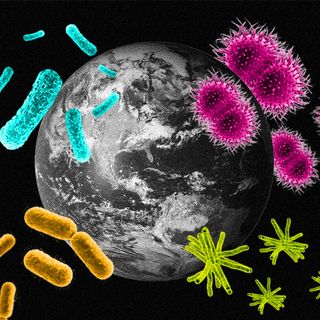In what is perhaps the coolest — and most existential — idea to come out of astronomy this week: dark energy may be dying, and the universe may be shrinking until its own eventual death, and possible rebirth. A new analysis published in PNAS says as much in many more words and equations.
To explain the universe’s movements, the study’s conclusion also throws new light on the properties of dark energy, an invisible entity about which we still know very little. The essence is this: dark energy is a force that acts as anti-gravity, a repellant force countering gravity’s attractive force. Until a few billion years ago, dark energy had but a small role in the universe’s expansion, but it soon overtook everything else to become the dominant factor.
According to a theory proposed by Einstein, dark energy is a “cosmological constant” — meaning that it is an unchanging part of the universe’s laws. But researchers have now surmised that dark energy can “decay” — meaning it can die, and perhaps turn into ordinary, stable matter as we know it. In this theory, dark energy is called “quintessence” and is dynamic in nature.
Right now, we know that the universe is expanding. The repellant nature of dark energy helps this process along. But the expansion could be slowing down because dark energy may be entering a phase in its cycle where it decays, causing its repellant energy to diminish.
“Although the universe is expanding at an accelerating rate today, this paper presents a simple mechanism by which a dynamical form of dark energy (known as quintessence) could cause the acceleration to come to end and smoothly transition from expansion to a phase of slow contraction,” the paper states.
Related on The Swaddle:
In A World First, Scientists See Black Hole Colliding With a Neutron Star
Indeed, this has perhaps already happened: scientists predict that 65 million years from now, the universe will halt its expansion and begin to reverse the process to start shrinking.
“Going back in time 65 million years, that’s when the Chicxulub asteroid hit the Earth and eliminated the dinosaurs… On a cosmic scale, 65 million years is remarkably short,” Paul Steinhardt, Director of the Princeton Center for Theoretical Science at Princeton University in New Jersey and the study’s co-author, told Live Science.
There are two possible consequences of a shrinking universe. One is that it could end in a collapse of all matter into itself, ending space-time as we know it. Another is that it could result in another Big Bang — which would mean that the universe follows a cyclical process of expansion and contraction. Our universe today, then, would be just one in a long line of universes with their own rules.
Another matter to contend with is the fact that we may already be hurtling toward the big “crunch” — any observations that astronomers make now is information they have received from the past. Theories about the fate of our universe — and indeed, whether ours has been the only universe at all — have abounded for a long time.
But the new ideas around the role of dark energy could be the missing link, providing clues. We won’t be around to find out what really does happen in the end, making the clues vitally important in understanding the story of us, our origins, and our inevitable cosmic end.




